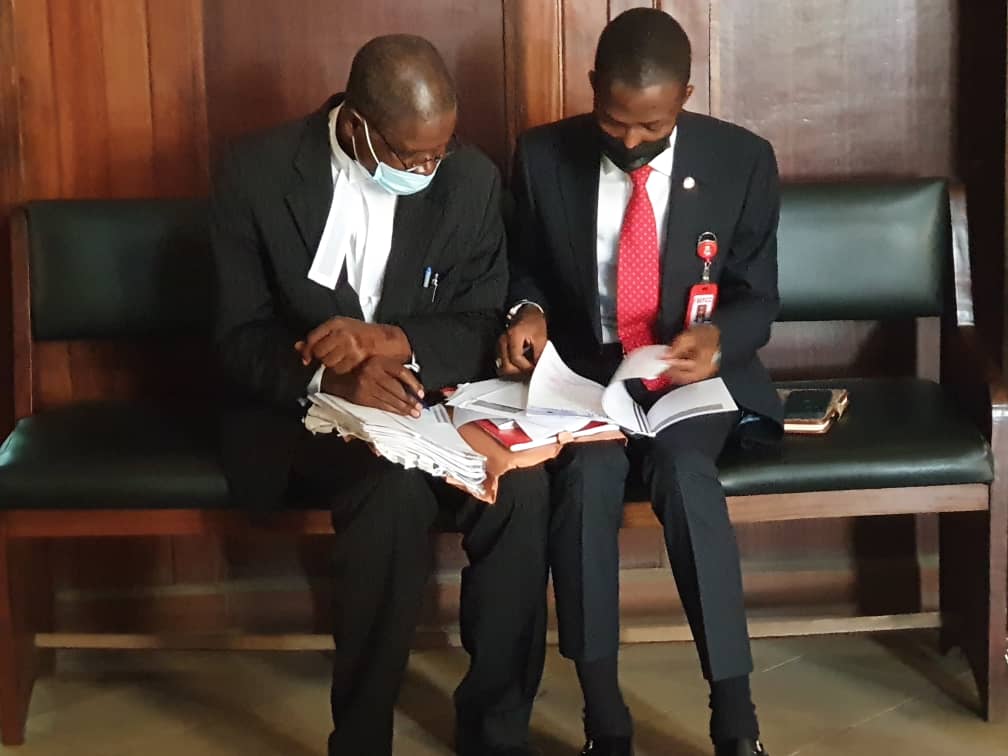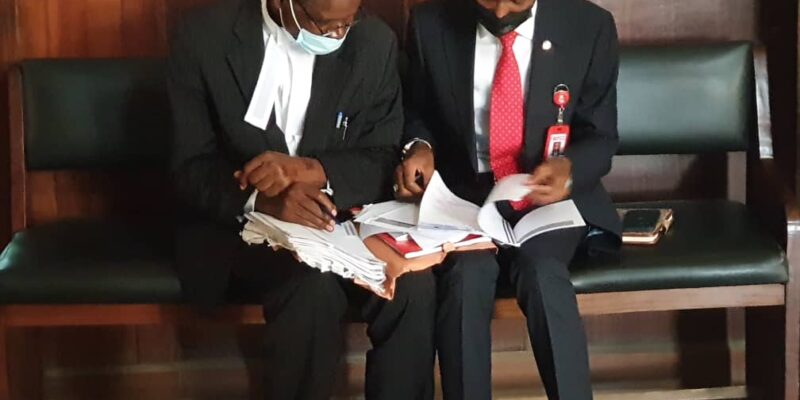
“Bawa this morning when he was preparing for the case with the EFCC lawyer”
The newly appointed chairman of the Economic and Financial Crimes Commission (EFCC), Mr Abdulrasheed Bawa on Wednesday appeared before an Ikeja High Court to testify as a prosecution witness in a N1.4billion oil subsidy fraud case.
Bawa, 40, who was confirmed as the chairman of the anti-graft agency by the Senate on Feb. 24, resumed office on March 5, 2021.
He was in court to testify in the case involving Nadabo Energy and its chairman, Abubakar Peters, one of the cases of alleged fraud that he investigated when he was an operative of the EFCC.
The anti-graft agency is prosecuting the defendants for allegedly obtaining N1.4billion from the Federal Government as oil subsidy using forged documents.
The defendants are also accused of allegedly inflating the quantity of premium motor spirit (PMS) purportedly supplied to the FG to 14,000 metric tonnes.
Led in evidence by the lead EFCC prosecutor, Mr Seidu Atteh, Bawa narrated to the court how he investigated the case.
He said that he had analysed some email correspondences and found out that the defendants contrary to their claims, took only approximately 6million liters of PMS on board the mother vessel MT Evriduk into their own chartered vessel MT St Vanessa.
“Emails further confirmed that the same quantity of PMS (6million liters) was discharged at Port Harcourt. The email also informed us that one Mr Jideofor Akpan was the agent of the vessel (MT St Vanessa).
“We invited the said Mr Akpan and during the course of our interview with him, he confirmed to us the EFCC that the first defendant (Nadabo Energy) through the second defendant (Peters) chartered the vessel (MT St Vanessa) and paid for it.
“My lord he volunteered the statement to us and also submitted several documents to us,” Bawa said.
The EFCC boss said during the interview, he presented the purported shipping documents that the defendants submitted to the Petroleum Price Regulatory Agency (PPRA) for payment of subsidy to Mr Akpan.
“We presented it to him to confirm to us whether or not the vessel that he is the agent for had anything to do with the vessel called MT American Express.
“MT American Express is the vessel the defendant claimed to have given the product to his own vessel.
“My Lord, Mr Akpan confirmed to us that MT St Vanessa had nothing to do with MT American Express but rather St Vanessa loaded product from MT Evriduk,” he said.
Bawa noted that as part of his investigations, he wrote a letter of investigation to Petrocam, the trader that supplied the defendant with the petroleum products.
He said a request was made in the letter for all the financial and shipping documents in respect of transactions with Nadabo Energy.
“My lord, Petrocam responded to our letter in writing attaching all requested documents which include a performa invoice, commercial invoice, letter of credit and bill of laden,” he said.
Bawa said that the EFCC also wrote a letter of investigations of activities to the Corporate Affairs Commission (CAC) to confirm the registration status of Nadabo Energy.
He said the CAC responded in writing by forwarding the Certified True Copies (CTCs) of all the documents requested.
“On receipt of the response, we studied it and found out that the second defendant (Peters) is a shareholder as well as he director of the first defendant.
“My Lord in furtherance to that, we invited two of the directors and shareholders of the first defendant company namely – Mr Akeem Abalaka and one Mr Sanni.
“My lord, they both confirmed to us that although they are linked to the company, they are not involved in the contentious matters of this honourable court,” he said.
During Bawa’s testimony, the EFCC sought to tender the CTCs of the documents it received from Petrocam and the CAC.
The defence counsel, Mr E.O Isirameh however objected to the tendering of the documents by the EFCC.
His objection was on the grounds that the documents are invalid because they were produced by the prosecutors several years after the subsidy transaction had occurred.
Justice Christopher Balogun adjourned the case until April 28 for ruling and continuation of hearing.

Comments